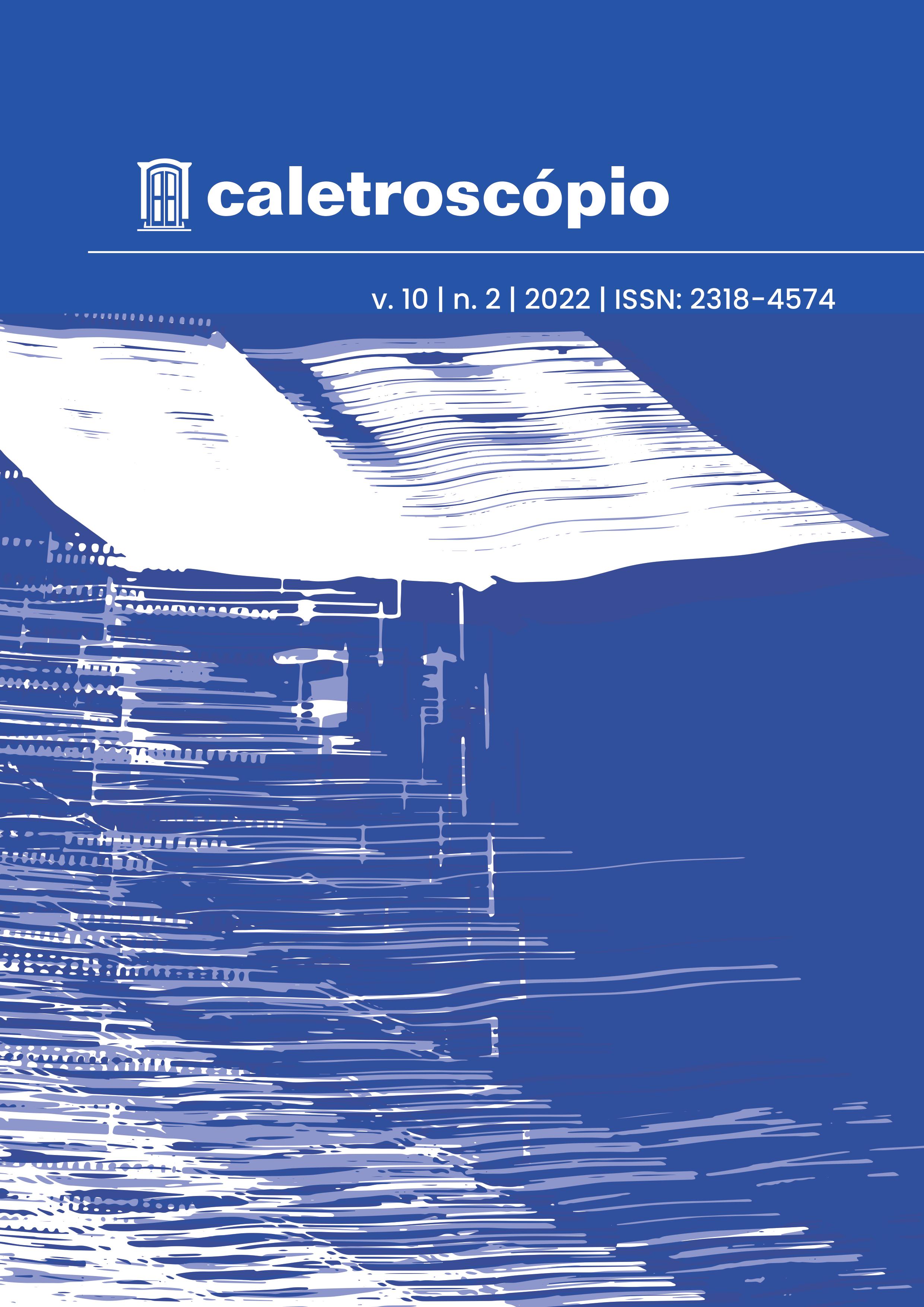Do canto da sala para o centro da aula:
expandindo perspectivas no ensino/aprendizagem de inglês inclusivo
Abstract
Inclusive education is an old discussion, however, in the teaching and learning of English, it still faces challenges. In this sense, this paper will approach the pedagogical elaborations on inclusive education and will discuss the potential that the university-school-nucleus to support inclusion partnership presents for teacher training. The research was developed within the scope of the XXX project during hybrid learning in 2021 and is supported by the description of the didactic sequence elaborated and in the discourse of a teacher, under the Discourse Analysis. We highlight the work of members of the university, school and inclusion support center to think about the inclusion of students with special educational needs and a mobilization of the teaching and learning process as a whole, to promote other inclusions such as that of socially vulnerable students. We defend that inclusive education is seen as a total reformulation of the space and time of teaching and school to be effectively worked on
Downloads
References
CAMPOS, Isabela de Oliveira. Parceria Universidade-Escola na Sala de Aula de LI: (rel)ação, legitimação e deslocamentos do dizer/fazer. 181f. Dissertação (Mestrado em Linguística Aplicada) - Faculdade de Letras, Universidade Federal de Minas Gerais, Belo Horizonte, 2019.
CANAGARAJAH, Suresh. Materializing ‘Competence’: Perspectives from International STEM Scholars. The Modern Language Journal, v. 102, n. 2, p. 1-24, 2018.
CÉSAR, Cynthia Fernanda Ferreira. A vivência de professores de língua inglesa em contexto inclusivo. 98f. Tese (Doutorado em Linguística Aplicada e Estudos da Linguagem). Pontifícia Universidade Católica de São Paulo. São Paulo, 2013.
COSTA LEITE, Patrícia Mara de Carvalho. “E o sonho da menina que queria ser professora (nem que seja por um dia) torna-se realidade!”: Os Letramentos Críticos no estágio supervisionado de língua inglesa. Curitiba: CRV, 2018.
DOS SANTOS, Carla Cristina Gaia. A formação de professores de línguas e de língua inglesa para a educação inclusiva: mapeando lacunas e avanços. Revista Versalete, v. 8, n. 15, p. 53-72, 2020.
FONSECA, Rochele Paz; SGANZERLA, Giovana Coghetto; ENÉAS, Larissa Valency. Fechamento das escolas na pandemia de Covid-19: Impacto socioemocional, cognitivo e de aprendizagem. Revista Debates em Psiquiatria, v. 10, n. 4, p. 28-37, 2020.
FOUCAULT, Michel. Vigiar e punir: nascimento da prisão. Rio de Janeiro: Vozes, 2009.
FREIRE, Paulo. Pedagogia do oprimido. Rio de Janeiro: Paz e Terra, 1970.
GRIGOLETTO, Marisa. Representação, identidade e aprendizagem de língua estrangeira. In: CORACINI, Maria Jose. (Org.) Identidade e discurso: (des) construindo subjetividades. Campinas: Editora Unicamp. Chapecó: Argos, 2003, p. 223-238.
HENZ, Rossana Regina Guimarães Ramos. Apresentação de Pesquisas: Inclusão e BNCC. YouTube. Disponível em: <https://www.youtube.com/watch?v=NDTfleX0hJs> Acesso em: 18 fev. 2022.
HORNSTRA, Lisette; DENESSEN, Eddie; BAKKER, Joep; VAN DEN BERGH, Linda; VOETEN, Marinus. Teacher attitudes toward dyslexia: Effects on teacher expectations and the academic achievement of students with dyslexia. Journal of Learning Disabilities, v. 43, n. 5, p. 515–529, 2010.
LIBERALI, Fernanda Coelho. Construir o inédito viável em meio a crise do coronavírus - lições que aprendemos, vivemos e propomos. In: LIBERALI, Fernanda Coelho; FUGA, Valdite Pereira; DIEGUES, Ulysses Camargo Corrêa; CARVALHO, Márcia Pereira. Educação em tempos de pandemia: Brincando com um mundo possível. Campinas: Pontes, 2020, p. 13-21.
LOPES, Rubens Fernando Souza. Material didático de língua inglesa: uma possível ferramenta para a inclusão de alunos em situação de risco no processo de ensinoaprendizagem. The ESPecialist. São Paulo, v. 1, n. 37, p. 87-111, 2016.
KUMARAVADIVELU, B. Beyond Methods: macro strategies for language teaching. New Haven: Yale University Press, 339 p, 2003.
LOWE, Robert J.; SCHAEFER, Matthew. Y.; TURNER, Matthew W. Uncovering Diverse Perspectives and Responses to Working with English Learners with Special Educational Needs. In: BANEGAS, Dário Luis; BEACON, Griselda; BERBAIN, Mercedes Pérez. (Orgs.) International Perspectives on Diversity in ELT. Palgrave, Macmillan, 2021, p. 229-246.
ORLANDI, Eni. Análise de Discurso: Princípios e procedimentos. 12ed. Campinas:
Pontes, 2015.
PAIVA,Vera Lúcia Menezes de Oliveira; FIGUEIREDO, Francisco José Quaresma. O ensino significativo de gramática em aulas de língua inglesa. In: PAIVA, Vera Lúcia Menezes de Oliveira e. (Org.) Práticas de Ensino e Aprendizagem de Inglês com Foco na Autonomia. Campinas: Pontes, 2010, p.173-188.
REIS, Valdeni da Silva. Time, Space and Memory in the Teaching and Learning of English Within a Brazilian Juvenile Detention Centre: The Effect of Suspension in a Confused Space. In: MURRAY, Garold; LAMB, Terry. Space, Place and Autonomy in Language Learning. London: Routledge, 2018, p. 179-198.
REIS, Valdeni da Silva; CAMPOS, Isabela de Oliveira. “Onde está a universidade?” Do discurso da (des)qualificação à presença colaboradora. Imagens Da Educação, v.11, n. 2, p. 190-211, 2021.
REVUZ, Christine. A língua estrangeira entre o desejo de um outro lugar e o risco do exílio. In: SIGNORINI, Inês. (Org.) Língua(gem) e identidade: elementos para uma discussão no campo aplicado. Campinas: Mercado das Letras, 1998, p.213-230.
SOUSA, Gasperim Ramalho de. Por uma língua estrangeira inclusiva: O letramento crítico e a teoria da complexidade no ensino de inglês. 315f. Tese (Doutorado em Estudos da Linguagem). Centro Federal de Educação Tecnológica de Minas Gerais. Belo Horizonte, Minas Gerais, 2020.
The publication Caletroscopio shall retain for a period of three years all authorial rights for works accepted for publication: articles, reviews, translations, etc. Outside this restriction, these works are licenced through Licença Creative Commons-Atribuição-NãoComercial-SemDerivações 4.0 Internacional.
Upon expiry of this period, in the event that the author publishes the text, even when making alterations to the original, we would ask authors to include as a footnote, the information that a previous version of the article was published in the Revista Caletroscópio, citing the appropriate references.


